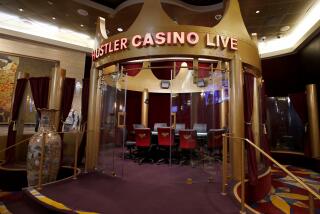Lendl Mired in Lawsuits : Breach-of-Contract Battles Serve as Revealing Look Into the Business Side of Big-Time Men’s Pro Tennis
- Share via
It used to be that professional tennis players, such as Ivan Lendl, fought their toughest battles on the tennis court.
These days, though, the world’s No. 1 tennis player is fighting not only those who would usurp his ranking on court but also against those who, he says, would take his money in court.
Lendl is embroiled in three lawsuits at the moment, including one countersuit against his former management firm that seeks more than $40 million in damages.
This world-class warfare began last October, when Lendl ended his seven-year association with ProServ, a Washington-based sports management firm. Problem was, his contract ran through 1992. ProServ filed for breach of contract in February, and a trial date in that case has been set for Oct. 4.
Lendl then filed his own breach-of-contract complaint against ProServ May 5. A reading of the 32-page complaint, filed in U.S. District Court in Connecticut, reveals as much about the inner workings of big-time tennis as it does about the business affairs of both Lendl, the millionaire, and ProServ, the multidimensional management firm.
Among other illuminating bits culled from the court papers:
--ProServ charged Lendl in two ways. The company got a flat fee of $25,000 annually and also got a 7.5% commission on Lendl’s merchandising, exhibition and appearance income. The commission rate is low by industry standards. Some players pay as much as 25%.
--ProServ clients have a guaranteed minimum income from non-tennis activities. Lendl was guaranteed $500,000 but claims that other players’ guarantees were for twice as much as his. Lendl claims that ProServ steered sponsors to other clients, where ProServ stood to make more in commissions.
--Lendl’s complaint points to the potential for conflict among ProServ’s various functions. When it was acting as a personal agent, ProServ would try to get Lendl the best deal--most money--possible. Acting as a representative for corporate sponsors, ProServ would try to get them the best deal--most exposure for the least money--possible. Acting as an event promoter, ProServ would try to get the most money from sponsors while paying the players the least money possible.
As an example, Lendl cites ProServ’s relationship with Volvo of North America. The agency represents Volvo in its sports marketing in tennis. Lendl claims that ProServ sold his services too cheaply to Volvo, so it could cement its relationship with the car maker.
--Lendl will be paid $125,000 for a one-day appearance in the World Big 4 exhibition event to be held in Tokyo in November. If this is Lendl’s market value for exhibitions, he could make more money playing a limited schedule of these special events than from a full season on the tour.
That is saying a lot, considering Lendl’s earning power. Last year, he earned $1.6 million in nine days by winning the Stakes Match and, a few days later, his fifth Masters title.
--Lendl claims that ProServ officials took advantage of his friendship with Polish player Wojtek Fibak, who was already a ProServ client. According to the complaint, ProServ promised financial guarantees to Fibak if he could persuade Lendl to become a client. Then, after Lendl had signed with ProServ, the agency packaged the two players to ensure that Fibak got the money he was promised.
Lendl also alleges that ProServ knew of instances in which he could not compete in a tournament or exhibition, but, because ProServ was the event promoter, withheld that information from the public so as not to affect ticket sales.
Lendl’s complaint cites as an example the PaineWebber Classic in Orlando, Fla., in March of 1987. The event was run by ProServ. An injury forced Lendl to withdraw from the tournament a week before the event.
According to the complaint, “In order to maintain interest in the event and preserve ProServ’s ticket sales, defendants concealed from the public the fact that Lendl had withdrawn. Lendl’s withdrawal was not disclosed until the weekend of the event, after reports appeared in the press. As a result, Lendl’s professional reputation was injured at the expense of preserving ProServ’s income from ticket sales.”
In a similar case, Lendl failed to show for an exhibition last November at the Forum. Organizers of the event were sent scrambling to replace Lendl, who said he had not been aware that he was scheduled to play. He said he had a conflicting commitment.
Lendl’s countersuit has received more attention than the ProServ complaint because of its specific charges. It also discloses some practices, such as the packaging of players in tournaments, that the Men’s International Professional Tennis Council, which governs tennis, frowns upon.
ProServ, in a statement released May 6, said:
“In our view it is simply an attempt to muddy the waters and create a diversion from the central issue--his breach of contract. Our representation of Lendl speaks for itself. We did an outstanding job on his behalf for seven years.”
Jerry Solomon, ProServ president and Lendl’s personal agent for much of the seven years Lendl was with the company, said that he is confident the accusations will be disproved in court.
“There are a lot of factual inaccuracies and innuendoes, a lot of groping in the dark trying to hit on something,” Solomon said. “There is certainly no question in my mind that there will be a completely different version of things than he’s brought up in his complaint.”
Solomon said the basis of the ProServ suit is to seek payment of commission fees they believe Lendl owes. “He simply does not want to pay his fees under the contract,” he said.
Lendl signed a contract with ProServ June 11, 1980, for worldwide management services and representation. There were subsequent other written agreements, the most recent of which was June 12, 1986. It was to end Dec. 31, 1992.
Last October, Lendl, and his company, Taconic, terminated the agreement, effective Dec. 15, 1987. According to Lendl, there was a clause that allowed him to do so if he was dissatisfied with ProServ’s performance.
Lendl has since said he will honor all previous promotional commitments called for in the contract.
That case will come to trial in Washington, and it is possible that Lendl’s complaint may be heard at the same time.
“I don’t think this thing is good for anybody,” Solomon said. “I don’t think it’s good for our industry, it’s not good for professional athletes. I don’t think there’s anything good about it.”
Said Jennifer Proud, a spokeswoman for Lendl: “It’s safe to say that Ivan has come away from this whole thing with the intent that he’s not going to let someone sign for him. He’s going to be there in the end with a pen.” Meanwhile, Lendl has also been named in a breach-of-contract suit by VHS Productions of Greenwich, Conn. It charges that Lendl had contracted to appear in an instructional video for which he was to be paid $110,000.
A contract was originally negotiated and signed by Solomon on Lendl’s behalf Oct. 2, 1987. Soon thereafter, Lendl severed his ties with ProServ. His attorney, William Bricker, renegotiated the contract on behalf of Lendl’s new company, with more favorable terms to Lendl.
Based on the new contract, VHS went ahead with plans to shoot the video Feb. 9-11 at La Costa. When Lendl failed to show, VHS filed a complaint in Connecticut Superior Court for breach of contract.
“To this day, we haven’t been told why Ivan didn’t come,” said Andrew Nemiroff, VHS’ attorney. “They spent more than $100,000 in preparations. They had seven suites in the hotel. They had all his left-handed golf clubs. They had his golf date with Lee Trevino. Everyone was there, waiting.”
Lendl contends the contract was invalid because Solomon did not have the power to act on his behalf. VHS contends that is beside the point, that the second contract was negotiated by Lendl’s appointed representative and it was binding.
“The earlier stuff really doesn’t matter,” Nemiroff said. “(Bricker) doubled all the numbers. It was the same agreement, he just increased all the numbers.”
According to Nemiroff, Lendl was paid $10,000 in October of 1987, $50,000 in December and given a $50,000 letter of credit before the end of the year. Nemiroff said that Lendl cashed the $10,000 check but has not cashed the second one.
More to Read
Go beyond the scoreboard
Get the latest on L.A.'s teams in the daily Sports Report newsletter.
You may occasionally receive promotional content from the Los Angeles Times.











